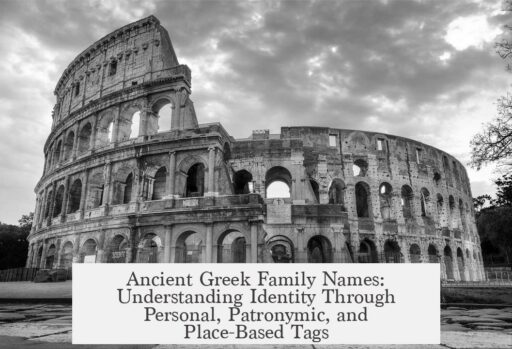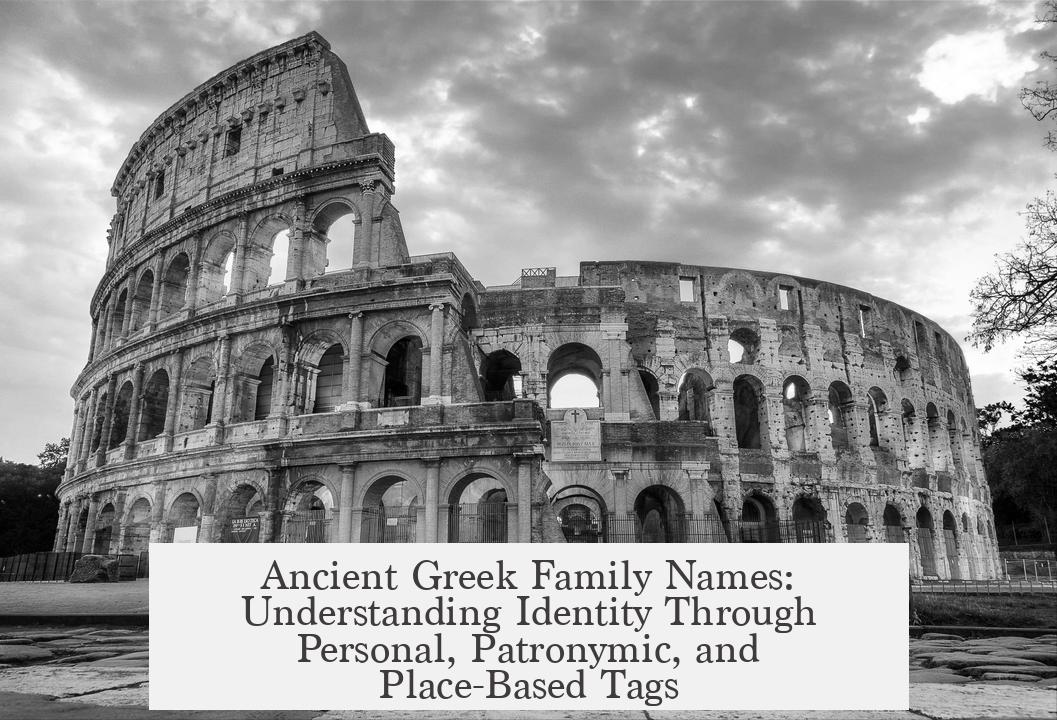Ancient Greek family names as known today did not exist. People were identified mainly by their given names and their patronymics—names derived from their father’s given name. For example, Kyniska Archidamou means Kyniska, daughter of Archidamos. This naming system clearly identifies immediate parentage but stops short of forming hereditary family names.

Since surnames were absent, ancient Greeks sometimes used the place of origin to distinguish individuals when needed. A person might be referred to by the city or village they came from to clarify identity. For instance, Aristodikos of Tanagra identifies Aristodikos by his city, Tanagra, differentiating him from others with the same name.
In Athens from 507 BC, a significant shift occurred to reinforce democratic bonds. Citizens were encouraged to identify themselves by their deme, the local administrative unit or district, rather than by patronymic alone. This practice connected individuals to a community and democracy more strongly. Official documents and inscriptions often listed people with their deme, like “Aristoteles of Marathon” or “Thrasyboulos of Kollytos.”
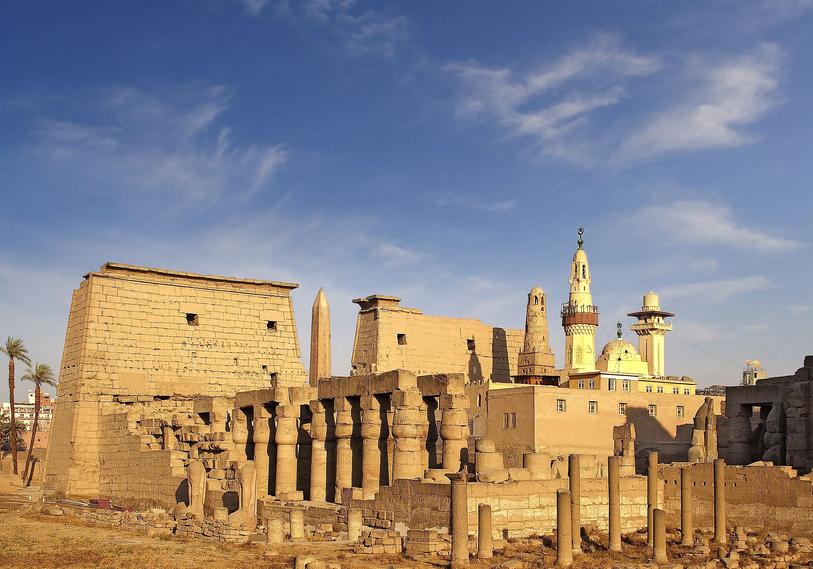
Despite absent surnames, prominent families created group or clan names derived from a famous ancestor. These clan names demonstrated descent, allegiance, and status. Allies and dependents sometimes also fell under these clan names. Such collective identities helped preserve the legacy of influential families across generations.
Royal dynasties provide some of the clearest examples of clan names. During the Hellenistic period, major ruling families adopted dynastic names from founding ancestors. The Seleukids descended from Seleukos I Nikator, the Ptolemies from Ptolemaios I Soter. The Antigonids and Attalids also followed this model. This naming tradition dates back to the Archaic period and earlier. Spartan royal houses, the Agiads and Eurypontids, were named after early kings Agis and Eurypon. Kings like Leonidas were identified by both patronymic and dynasty: “Leonidas son of Anaxandridas of the Agiadai.”
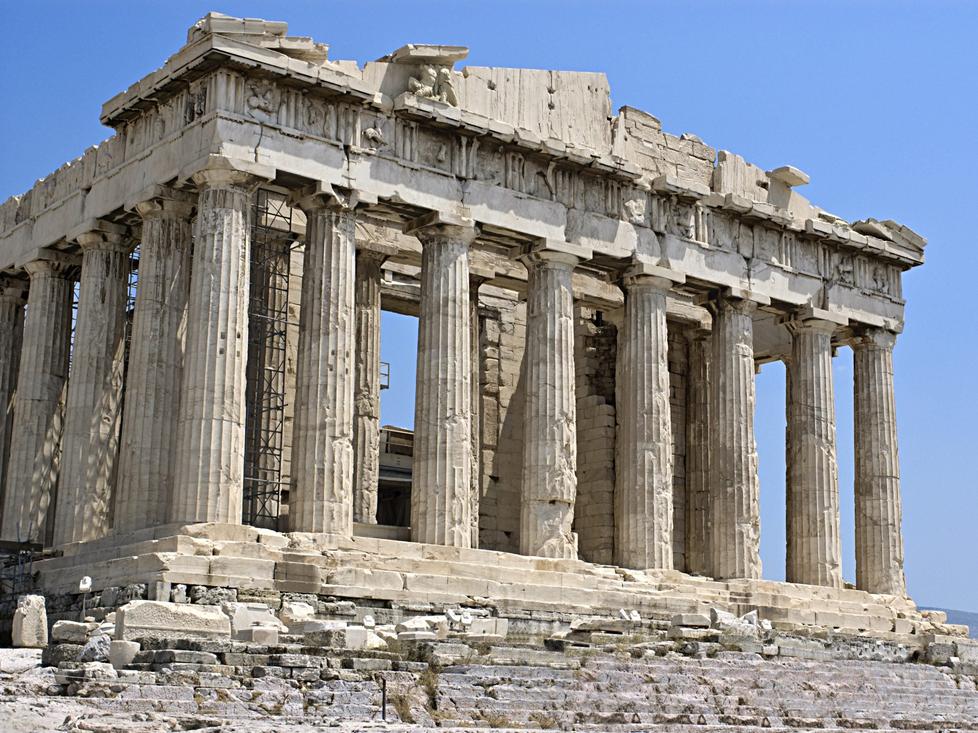
In Athens, some powerful families possessed clan names that linked members to notable ancestors and historic influence. The Alkmaionidai (Alcmeonids) and Philaidai (Philaidae) were prominent clans. These groups played key roles in political rivalries; for example, Perikles and Thoukydides represented Alkmaionidai and Philaidai lineages, respectively. Their ancestry included founders and heroes like Kleisthenes and Miltiades. Clan names carried reputations, histories, and even ancient curses thought to persist across centuries.
Nevertheless, clan and group names appear infrequently in surviving sources. The common practice favored identifying individuals by their immediate father’s name only. Genealogies rarely extended beyond one generation in writing. Families often followed naming patterns with recurring names alternating between generations. For example, Xenophon son of Gryllos named his son Gryllos. The famous Athenians Kimon and Miltiades alternated names in successive generations. Although texts typically mentioned only the immediate father, name repetition strongly implied belonging to a particular lineage.

| Aspect | Details |
|---|---|
| No surnames/family names | Identification by given name + patronymic |
| Place of origin | Used when distinction required (e.g., Aristodikos of Tanagra) |
| Demes in Athens | Citizens identified by local deme from 507 BC onward |
| Clan/group names | Used by prominent families to indicate ancestry and allegiance |
| Dynastic names | Hellenistic royal families (Seleukids, Ptolemies, etc.) |
| Powerful Athenian clans | Alkmaionidai, Philaidai linked to historic figures and politics |
| Common practice | Patronymic limited to one generation; name alternation implies lineage |
The naming conventions of the Ancient Greeks reflect their social and political structures. Names connected individuals directly to family and community rather than to a fixed family surname. Clan names and dynasties arose mainly among elites to emphasize heritage and political alliances. Place-based identifiers were a flexible tool for differentiation. Overall, the Ancient Greek naming system served to situate a person precisely within their immediate lineage and civic identity rather than establishing continuous family surnames.
- Ancient Greeks lacked hereditary surnames, using given names plus patronymics instead.
- Place of origin or deme (in Athens) helped distinguish individuals.
- Prominent families created clan or group names from famous ancestors.
- Royal dynasties were named for founders, e.g., Seleukids, Ptolemies.
- Athenian powerful clans like the Alkmaionidai linked members genealogically and politically.
- Naming patterns included alternating names across generations, implying lineage despite no recorded surnames.
What Were Ancient Greek Family Names Like? Unlocking the Mysteries of Greek Identity
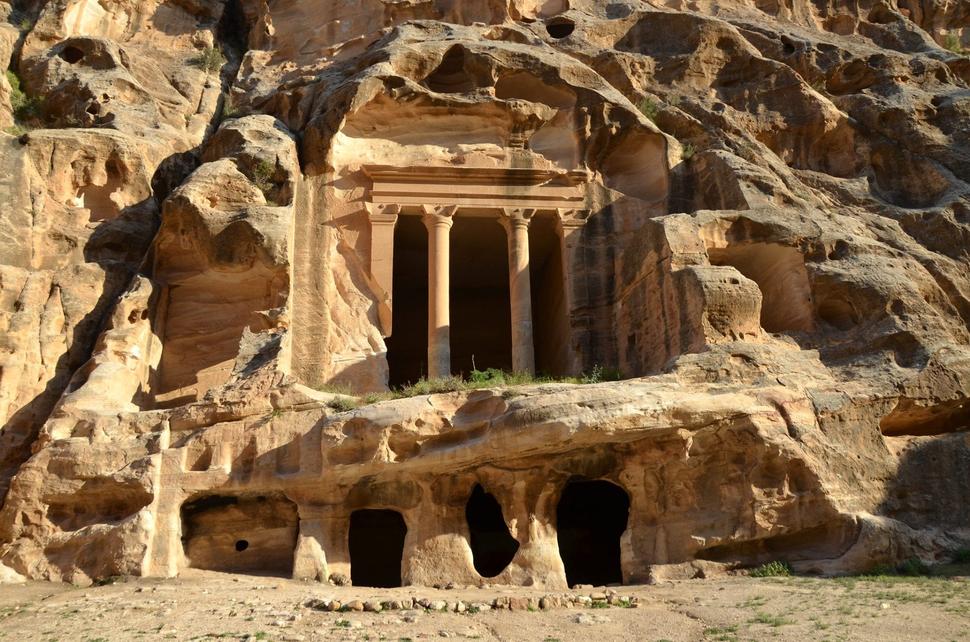
If you ask, “What were Ancient Greek family names like?”, the straightforward answer is: Ancient Greeks did not really have family names or surnames like we do today. Instead, they used personal names combined with their father’s name or sometimes their place of origin to tell people apart. It’s quite a different naming world than ours, and it reveals fascinating insights about their society, identity, and how they connected to their community.
Let’s dive into the intriguing nuances of ancient Greek naming conventions. Spoiler: it’s not as “last-name-first” as modern Western cultures expect!
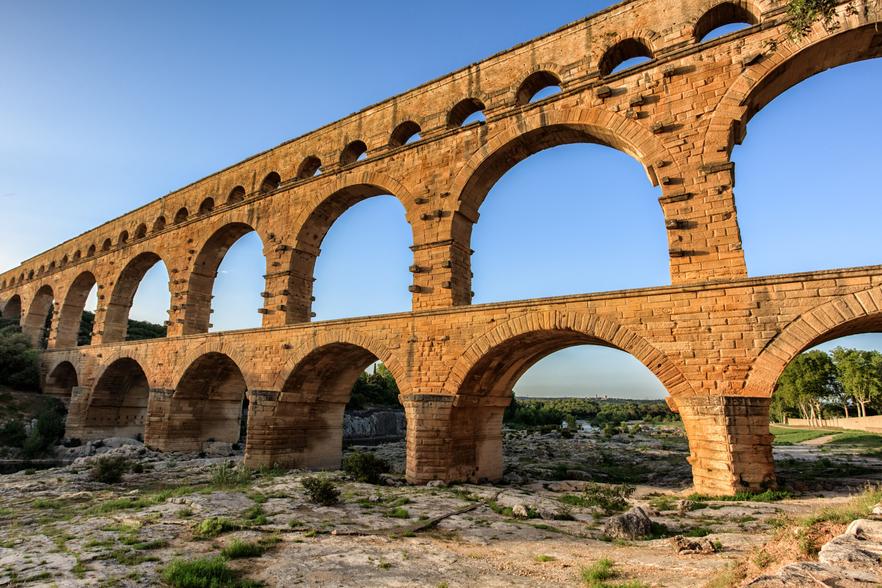
The Absence of Surnames: From Personal to Patronymic
The Ancient Greeks called each other by their given name, like “Kyniska,” and added their father’s name to identify specifically who they were. For example, “Kyniska Archidamou” means “Kyniska, daughter of Archidamos.”
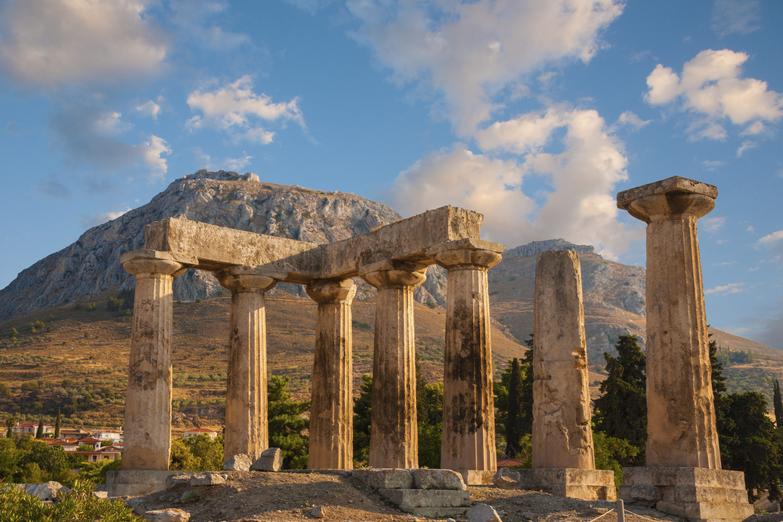
“The Ancient Greeks didn’t have surnames or family names. People were referred to by their given name and patronymic: Kyniska Archidamou, Kyniska the daughter of Archidamos.”
This patronymic system meant family names, as we know them, didn’t play a formal role. Instead of a family brand, lineage often showed up just one generation back, in the father’s name. This approach catered well to an oral culture where personal reputation and immediate family mattered more than distant ancestors—at least in everyday use.
Using Place of Origin as a Distinctive Tag
Imagine you live in a city full of people named “Socrates.” How do you tell them apart? The Greeks sometimes added the place of origin to a name for clarity.
“If it was more relevant to distinguish someone by their place of origin, that could be used as a sort of last name, like when Aristotle’s student tells us that Ephialtes son of Sophonides was murdered by Aristodikos of Tanagra.”
So Aristodikos was identified as “of Tanagra,” his hometown, a bit like today’s “Aristodikos from New York.” This creative workaround served as a pseudo-last name when necessary.
The Rise of the Deme Name in Athens: Strengthening Democracy Through Identity
After 507 BC, Athens took a fresh democratic twist on naming. Citizens were placed within one of 139 “demes,” local villages or districts, and encouraged to associate with their deme more than their father’s name.
“At Athens, the reorganisation of the administrative structure at the foundation of democracy placed everyone into demes. Citizens identified by deme rather than patronymic to feel more connected to the democracy.”
Official inscriptions would record names like:
- Aristoteles of Marathon
- Pyrrhandros of Anaphlystos
- Thrasyboulos of Kollytos
This shift reinforced civic identity and engagement over pure familial connection. People belonged to the democracy as part of a broader community subset, not just a bloodline. Pretty ahead of its time, right?
Prominent Families and Clans: When Group Names Took Center Stage
Though surname use was rare, prominent families sometimes created clan names based on famous ancestors to showcase descent and loyalty. Think of it as ancient branding among aristocrats.
“Particularly well-known families turned a famous ancestor’s name into a group name. Members of this ‘clan’ showed their lineage and allegiance. Allies and dependents could be included under the group name.”
For example, royal dynasties in later periods derived names from founding kings:
| Dynasty | Named After |
|---|---|
| Seleukids (Seleukidai) | Seleukos I Nikator |
| Ptolemies (Ptolemaioi) | Ptolemaios I Soter |
| Antigonids | Antigonos I Monophthalmos |
| Agiads (Spartan) | King Agis |
| Eurypontids (Spartan) | King Eurypon |
Kings like Leonidas would then be called “Leonidas son of Anaxandridas of the Agiadai,” mixing patronymic and clan identity in one elegant string of titles.
“Leonidas, son of Anaxandridas…” traces back to Herakles himself, hinting at divine ancestry in Spartan royal genealogy, as told by Herodotos.
Athens’ Historic Clans: The Alcmeonids and Philaidae
Famous Athenian clans gave political rivalry an extra punch. The rivalry between Perikles and Thoukydides wasn’t just personal; it echoed the age-old contest between the Alkmaionidai (Alcmeonids) and the Philaidai (Philaidae).
These clan names carried weight:
- The Alkmaionidai traced lineage to Kleisthenes, father of democracy.
- The Philaidae boasted Miltiades, the hero of Marathon.
Interestingly, the curse attached to the Alkmaionidai from centuries earlier was still believed to shadow Perikles. Talk about a long family feud!
“The curse incurred by the Alkmaionidai in 632 BC was thought to still cling to Perikles two hundred years later.”
Why Did Family Group Names Remain Rare?
Despite these notable examples, Greek sources rarely use group or clan names. The prevailing rule remained: identify a person by their given name and the name of their immediate father. This provided simple, clear identification ideal for a society focused on personal reputation and local citizen participation.
“Sources rarely show group names. People were usually identified by their father’s name alone.”
Generations passed names back and forth, showing lineage even when only one generation’s name appeared in records. For example:
- Xenophon, son of Gryllos, names his son Gryllos (son of Xenophon).
- Kimon, son of Miltiades, has descendants who alternate these names.
This subtle tradition quietly highlights ancestry and family bonds without official surnames. It’s like a secret code for lineage.
Wrapping It Up: What the Absence of Family Names Tells Us
In a nutshell, Ancient Greek “family names” don’t fit our modern molds. They didn’t need fixed surnames because society valued immediate family ties, place, and community belonging more.
Instead of last names, Greeks used given names combined with their father’s name, place of origin, or deme affiliation to distinguish people. Occasionally, powerful clans or royal dynasties adopted group names for political and social status.
So next time you think about names, remember: in Ancient Greece, your identity rolled right off your tongue as “X, son of Y” or “X of Z.” No frills, just straight-up lineage and place—simple and effective.
Does this ancient naming style make you rethink how you connect with your family name today? Could the democratizing approach of Athens, where place trumped family, offer modern lessons on belonging? Food for thought.
Did Ancient Greeks have family surnames like we do today?
No, Ancient Greeks did not have surnames or family names. They were usually identified by their given name plus their father’s name, known as the patronymic.
How did Athenians distinguish individuals within their democracy?
From 507 BC, Athenian citizens were identified by their deme, a local village or district, rather than just by their father’s name. This promoted a stronger connection to their local community and democracy.
What role did clan or group names play in Ancient Greek families?
Prominent families sometimes used the name of a famous ancestor as a clan name to show descent and allegiance. This practice was common among powerful dynasties like the Seleukids and Ptolemies.
Were clan names common throughout all Ancient Greece?
Clan or group names appeared rarely in sources. Most people were identified with only their given name and their father’s name, covering just one generation.
Did ancient Greek families reuse names across generations?
Yes, names often alternated through generations, such as sons being named after grandfathers. This hinted at lineage even though historical records mentioned only the immediate father’s name.
